Director: Ken Kaplan
Release Date: 2001
Contains spoilers
You would be forgiven for thinking that South African movie Pure Blood was going to be shlock horror, given that its DVD release is by Troma – the same company that gave us the Toxic Avenger and, the wonderfully titled, Chopper Chicks in Zombietown. The truth, however, is that this is a very strange, low budget, almost art-house film of surrealistic proportions and this surrealism is both the saving grace and downfall of the movie.
The DVD opens with a brief word from Ken Kaplan in which he makes it very clear that this is a political movie, a movie that shows a futile and disturbing grasping for the old ways of apartheid during the upheavals of the political shift in South Africa. He also states that it is a zombie movie but, despite the fact that Kaplan is the film’s director, the very fact that I am reviewing this should give you an indication that it is a vampire movie – though an obscure and bizarre vampire movie at that.
The film proper starts with some written notes, interspersed with images of dog obedience and soldiers, surrounding an experiment performed by one of the old regime’s Generals (Marius Weyers). The notes on screen are annoying in that they flicker and shift, making them difficult to read. As the film progresses we learn more about the experiments but it seems that the General wanted to create a person of pure blood, a person whose blood could offer immortality to the regime and its members. He took a virgin girl and impregnated her; the resultant off-spring would have pure blood. The girl, Gertrude, grew to be a woman (played by Aletta Bezuidenhout) who was tormented by her younger self (played by Amanda Lane) and this inner torment is key to the movie. Older Gertrude then lived for her son, Faan (Carl Beukes).
a person whose blood could offer immortality to the regime and its members. He took a virgin girl and impregnated her; the resultant off-spring would have pure blood. The girl, Gertrude, grew to be a woman (played by Aletta Bezuidenhout) who was tormented by her younger self (played by Amanda Lane) and this inner torment is key to the movie. Older Gertrude then lived for her son, Faan (Carl Beukes).
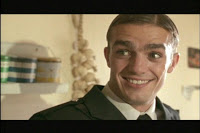 We see Faan returning home from work on his bicycle. He is in a uniform and is a rookie policeman. When he gets home his mother and their friend Hope (Nomsa Nene), who appears to live in a small shack on their property, are in the living room. He tells his mother that he has seen a man hanging around outside. He goes to see who it is and we hear a scream from inside. Going back into the house Faan sees that there is an older man in the living room, who identifies himself as Eugene (Danny Keogh), the brother whom Faan had been told was dead.
We see Faan returning home from work on his bicycle. He is in a uniform and is a rookie policeman. When he gets home his mother and their friend Hope (Nomsa Nene), who appears to live in a small shack on their property, are in the living room. He tells his mother that he has seen a man hanging around outside. He goes to see who it is and we hear a scream from inside. Going back into the house Faan sees that there is an older man in the living room, who identifies himself as Eugene (Danny Keogh), the brother whom Faan had been told was dead.
As the film progresses we see that there is a relationship, from the past that Eugene wishes to resurrect, between the older brother and the mother. I have read comments regarding the incestuous nature of this but it clearly is not. The narrative makes it abundantly apparent that Faan and Eugene have different mothers and there is no biological connection between Eugene and Gertrude. Faan is pleased to see his brother, Gertrude less than pleased.
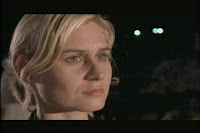 We see Faan giving blood. These are for blood tests as he hopes to be promoted to the elite flying squad. In the police station we also meet a member of the squad, Craig (Chris Vorster) who always carries a portable electric torture device – he has no moral qualms about using it as it is a device to reach the truth in his opinion. We also see a blossoming romance between Faan and Becky (Emily McArthur), who is a member of a private security firm.
We see Faan giving blood. These are for blood tests as he hopes to be promoted to the elite flying squad. In the police station we also meet a member of the squad, Craig (Chris Vorster) who always carries a portable electric torture device – he has no moral qualms about using it as it is a device to reach the truth in his opinion. We also see a blossoming romance between Faan and Becky (Emily McArthur), who is a member of a private security firm.
Gertrude makes cakes for a living and is commissioned to make many cakes for an event that will be attended by the top South African politicians and police chiefs. She always uses red icing sugar but has run out of food colouring. Faan finds (what he thinks is) some in a cupboard called the “blood of sacrifice”. Gertrude reacts strongly to it and says it needs throwing out. Later Eugene finds it and recognises it. He pours some on a plate and dips his finger in it, it burns like acid.
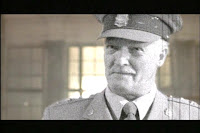 He takes the blood of sacrifice to an abandoned museum and starts shouting at his father, the General. He throws the blood of sacrifice to the floor and is suddenly flanked by two masked soldiers as smoke pours from the liquid, solidifying into his father. The General at first appears like a TV image, grey and static filled, but quickly solidifies to colour. He tells Eugene that Faan is the key, he has pure blood. Eugene was a failed experiment as his mother lied about her virginity. He gives Eugene a syringe of his own blood, he wants Eugene to inject the young man and then bring him to the museum.
He takes the blood of sacrifice to an abandoned museum and starts shouting at his father, the General. He throws the blood of sacrifice to the floor and is suddenly flanked by two masked soldiers as smoke pours from the liquid, solidifying into his father. The General at first appears like a TV image, grey and static filled, but quickly solidifies to colour. He tells Eugene that Faan is the key, he has pure blood. Eugene was a failed experiment as his mother lied about her virginity. He gives Eugene a syringe of his own blood, he wants Eugene to inject the young man and then bring him to the museum.
Gertrude is behind on a cake order and Faan helps her finish the cakes. Late into the night he falls asleep at the kitchen table and is awoken the next morning by a knock at the door. It is the Doctor (Joss Levine) and his wife (Jennifer Steyn) who are to buy the cakes. They have not been iced. Faan goes to wake his mother but she does not move. The Doctor looks in on her and, on moving the sheets, we see the bed is stained with blood – she has slashed her own wrists and bled to death.
Later Eugene returns home, Faan wishes to call the ambulance to take her corpse but Eugene refuses. Once Faan has left the house, Eugene injects her with the blood. When Faan gets home his brother is finishing the cakes and then the mother walks in. In truth she is quite zombie like. She rarely speaks, her movements are jerky and the only thing she seems to do is make cakes. The Doctor and his wife turn up and Faan does not know how he will explain her miraculous recovery, but when they enter the kitchen she has transformed to her younger self. This version of her is much more articulate and of course is not recognised. They sit for dinner but young Gertrude gets the Doctor alone and manages to inject him – giving him the needle of blood once he has been infected.
 Soon both the Doctor’s wife, in a needlestick injury, and Eugene have been injected and infected. Faan, at first, does not know what is going on but the ever watchful Hope does. The vampires concoct a scheme to use their infected blood in the icing on the cakes in order to turn the new heads of South Africa.
Soon both the Doctor’s wife, in a needlestick injury, and Eugene have been injected and infected. Faan, at first, does not know what is going on but the ever watchful Hope does. The vampires concoct a scheme to use their infected blood in the icing on the cakes in order to turn the new heads of South Africa.
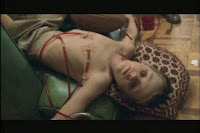 The vampirism is strange and unusual. Once infected, they get an intense desire to ingest blood and their reaction to it seems almost narcotic. We see them using blood packs and at one point they kidnap a child, whom they siphon in a clearly disturbing scene. They are sensitive to light and they wear earplugs as their hearing has become incredibly acute. Just ingesting the merest amount of the infected blood will turn a person.
The vampirism is strange and unusual. Once infected, they get an intense desire to ingest blood and their reaction to it seems almost narcotic. We see them using blood packs and at one point they kidnap a child, whom they siphon in a clearly disturbing scene. They are sensitive to light and they wear earplugs as their hearing has become incredibly acute. Just ingesting the merest amount of the infected blood will turn a person.
Gertrude is an interesting character, at first she seems to transform between her older and younger self. The older simply goes on, not realising she is dead, the younger is twisted and hateful for the way she was treated and is clearly manipulating the situation. Eventually these two become two separate entities.
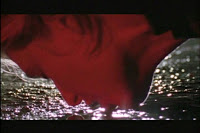 The film has some startling images, from a vampire sense, the infected Becky being hooked to many blood packs, or licking blood from the road at a car wreck work very well. The dreamlike imagery when Eugene is infected and he falls to the bed awash in blood is fantastic and the death of the general, killed by Eugene via an injection of more blood, is great in a visual sense with blood rising around him as he is surrounded by, what seems to be, representatives of the various peoples of South Africa.
The film has some startling images, from a vampire sense, the infected Becky being hooked to many blood packs, or licking blood from the road at a car wreck work very well. The dreamlike imagery when Eugene is infected and he falls to the bed awash in blood is fantastic and the death of the general, killed by Eugene via an injection of more blood, is great in a visual sense with blood rising around him as he is surrounded by, what seems to be, representatives of the various peoples of South Africa.
 The film stock quality is of a lower grade but we loose sight of that as we are drawn into the film. I found the acting good, I have read comments that the acting is appalling and I found this unfair, all the cast seemed natural, nothing seemed forced. Certainly this is not mainstream Hollywood acting, but that is not necessarily a bad thing. In many respects I got the feeling of perhaps an Australian movie in the tone of the film, I’ve always found Australian movies to have a certain quality within them that makes it clear they are from Down Under and this, for some reason, shares that ineffable quality.
The film stock quality is of a lower grade but we loose sight of that as we are drawn into the film. I found the acting good, I have read comments that the acting is appalling and I found this unfair, all the cast seemed natural, nothing seemed forced. Certainly this is not mainstream Hollywood acting, but that is not necessarily a bad thing. In many respects I got the feeling of perhaps an Australian movie in the tone of the film, I’ve always found Australian movies to have a certain quality within them that makes it clear they are from Down Under and this, for some reason, shares that ineffable quality.
 The problem with the film is within the surrealism. We are never too sure about what is occurring and the exposition is low. It might not have been a factor, but unfortunately it is. I wanted to more understand what was happening to the characters and this was not delivered. It is a distinct lack in narrative that leaves us cold within the film and that is a shame. I think, perhaps, an over-enthusiasm for the strong imagery involved made the filmmakers loose sight of the fact that a narrative is a key ingredient in a film, even one as surreal as this. As the film reaches its ending we become more confused, the film offers us even less narrative and whilst we get the bare building blocks of what has gone on we certainly get no clear answers.
The problem with the film is within the surrealism. We are never too sure about what is occurring and the exposition is low. It might not have been a factor, but unfortunately it is. I wanted to more understand what was happening to the characters and this was not delivered. It is a distinct lack in narrative that leaves us cold within the film and that is a shame. I think, perhaps, an over-enthusiasm for the strong imagery involved made the filmmakers loose sight of the fact that a narrative is a key ingredient in a film, even one as surreal as this. As the film reaches its ending we become more confused, the film offers us even less narrative and whilst we get the bare building blocks of what has gone on we certainly get no clear answers.
Without doubt, this is a strange film, worth seeing from a world cinema perspective and also worth seeing for a very different take on vampirism, but ultimately it proves unsatisfying. 4 out of 10.
The imdb page is here.
Release Date: 2001
Contains spoilers
You would be forgiven for thinking that South African movie Pure Blood was going to be shlock horror, given that its DVD release is by Troma – the same company that gave us the Toxic Avenger and, the wonderfully titled, Chopper Chicks in Zombietown. The truth, however, is that this is a very strange, low budget, almost art-house film of surrealistic proportions and this surrealism is both the saving grace and downfall of the movie.
The DVD opens with a brief word from Ken Kaplan in which he makes it very clear that this is a political movie, a movie that shows a futile and disturbing grasping for the old ways of apartheid during the upheavals of the political shift in South Africa. He also states that it is a zombie movie but, despite the fact that Kaplan is the film’s director, the very fact that I am reviewing this should give you an indication that it is a vampire movie – though an obscure and bizarre vampire movie at that.
The film proper starts with some written notes, interspersed with images of dog obedience and soldiers, surrounding an experiment performed by one of the old regime’s Generals (Marius Weyers). The notes on screen are annoying in that they flicker and shift, making them difficult to read. As the film progresses we learn more about the experiments but it seems that the General wanted to create a person of pure blood,
 a person whose blood could offer immortality to the regime and its members. He took a virgin girl and impregnated her; the resultant off-spring would have pure blood. The girl, Gertrude, grew to be a woman (played by Aletta Bezuidenhout) who was tormented by her younger self (played by Amanda Lane) and this inner torment is key to the movie. Older Gertrude then lived for her son, Faan (Carl Beukes).
a person whose blood could offer immortality to the regime and its members. He took a virgin girl and impregnated her; the resultant off-spring would have pure blood. The girl, Gertrude, grew to be a woman (played by Aletta Bezuidenhout) who was tormented by her younger self (played by Amanda Lane) and this inner torment is key to the movie. Older Gertrude then lived for her son, Faan (Carl Beukes). We see Faan returning home from work on his bicycle. He is in a uniform and is a rookie policeman. When he gets home his mother and their friend Hope (Nomsa Nene), who appears to live in a small shack on their property, are in the living room. He tells his mother that he has seen a man hanging around outside. He goes to see who it is and we hear a scream from inside. Going back into the house Faan sees that there is an older man in the living room, who identifies himself as Eugene (Danny Keogh), the brother whom Faan had been told was dead.
We see Faan returning home from work on his bicycle. He is in a uniform and is a rookie policeman. When he gets home his mother and their friend Hope (Nomsa Nene), who appears to live in a small shack on their property, are in the living room. He tells his mother that he has seen a man hanging around outside. He goes to see who it is and we hear a scream from inside. Going back into the house Faan sees that there is an older man in the living room, who identifies himself as Eugene (Danny Keogh), the brother whom Faan had been told was dead.As the film progresses we see that there is a relationship, from the past that Eugene wishes to resurrect, between the older brother and the mother. I have read comments regarding the incestuous nature of this but it clearly is not. The narrative makes it abundantly apparent that Faan and Eugene have different mothers and there is no biological connection between Eugene and Gertrude. Faan is pleased to see his brother, Gertrude less than pleased.
 We see Faan giving blood. These are for blood tests as he hopes to be promoted to the elite flying squad. In the police station we also meet a member of the squad, Craig (Chris Vorster) who always carries a portable electric torture device – he has no moral qualms about using it as it is a device to reach the truth in his opinion. We also see a blossoming romance between Faan and Becky (Emily McArthur), who is a member of a private security firm.
We see Faan giving blood. These are for blood tests as he hopes to be promoted to the elite flying squad. In the police station we also meet a member of the squad, Craig (Chris Vorster) who always carries a portable electric torture device – he has no moral qualms about using it as it is a device to reach the truth in his opinion. We also see a blossoming romance between Faan and Becky (Emily McArthur), who is a member of a private security firm.Gertrude makes cakes for a living and is commissioned to make many cakes for an event that will be attended by the top South African politicians and police chiefs. She always uses red icing sugar but has run out of food colouring. Faan finds (what he thinks is) some in a cupboard called the “blood of sacrifice”. Gertrude reacts strongly to it and says it needs throwing out. Later Eugene finds it and recognises it. He pours some on a plate and dips his finger in it, it burns like acid.
 He takes the blood of sacrifice to an abandoned museum and starts shouting at his father, the General. He throws the blood of sacrifice to the floor and is suddenly flanked by two masked soldiers as smoke pours from the liquid, solidifying into his father. The General at first appears like a TV image, grey and static filled, but quickly solidifies to colour. He tells Eugene that Faan is the key, he has pure blood. Eugene was a failed experiment as his mother lied about her virginity. He gives Eugene a syringe of his own blood, he wants Eugene to inject the young man and then bring him to the museum.
He takes the blood of sacrifice to an abandoned museum and starts shouting at his father, the General. He throws the blood of sacrifice to the floor and is suddenly flanked by two masked soldiers as smoke pours from the liquid, solidifying into his father. The General at first appears like a TV image, grey and static filled, but quickly solidifies to colour. He tells Eugene that Faan is the key, he has pure blood. Eugene was a failed experiment as his mother lied about her virginity. He gives Eugene a syringe of his own blood, he wants Eugene to inject the young man and then bring him to the museum.Gertrude is behind on a cake order and Faan helps her finish the cakes. Late into the night he falls asleep at the kitchen table and is awoken the next morning by a knock at the door. It is the Doctor (Joss Levine) and his wife (Jennifer Steyn) who are to buy the cakes. They have not been iced. Faan goes to wake his mother but she does not move. The Doctor looks in on her and, on moving the sheets, we see the bed is stained with blood – she has slashed her own wrists and bled to death.
Later Eugene returns home, Faan wishes to call the ambulance to take her corpse but Eugene refuses. Once Faan has left the house, Eugene injects her with the blood. When Faan gets home his brother is finishing the cakes and then the mother walks in. In truth she is quite zombie like. She rarely speaks, her movements are jerky and the only thing she seems to do is make cakes. The Doctor and his wife turn up and Faan does not know how he will explain her miraculous recovery, but when they enter the kitchen she has transformed to her younger self. This version of her is much more articulate and of course is not recognised. They sit for dinner but young Gertrude gets the Doctor alone and manages to inject him – giving him the needle of blood once he has been infected.
 Soon both the Doctor’s wife, in a needlestick injury, and Eugene have been injected and infected. Faan, at first, does not know what is going on but the ever watchful Hope does. The vampires concoct a scheme to use their infected blood in the icing on the cakes in order to turn the new heads of South Africa.
Soon both the Doctor’s wife, in a needlestick injury, and Eugene have been injected and infected. Faan, at first, does not know what is going on but the ever watchful Hope does. The vampires concoct a scheme to use their infected blood in the icing on the cakes in order to turn the new heads of South Africa. The vampirism is strange and unusual. Once infected, they get an intense desire to ingest blood and their reaction to it seems almost narcotic. We see them using blood packs and at one point they kidnap a child, whom they siphon in a clearly disturbing scene. They are sensitive to light and they wear earplugs as their hearing has become incredibly acute. Just ingesting the merest amount of the infected blood will turn a person.
The vampirism is strange and unusual. Once infected, they get an intense desire to ingest blood and their reaction to it seems almost narcotic. We see them using blood packs and at one point they kidnap a child, whom they siphon in a clearly disturbing scene. They are sensitive to light and they wear earplugs as their hearing has become incredibly acute. Just ingesting the merest amount of the infected blood will turn a person.Gertrude is an interesting character, at first she seems to transform between her older and younger self. The older simply goes on, not realising she is dead, the younger is twisted and hateful for the way she was treated and is clearly manipulating the situation. Eventually these two become two separate entities.
 The film has some startling images, from a vampire sense, the infected Becky being hooked to many blood packs, or licking blood from the road at a car wreck work very well. The dreamlike imagery when Eugene is infected and he falls to the bed awash in blood is fantastic and the death of the general, killed by Eugene via an injection of more blood, is great in a visual sense with blood rising around him as he is surrounded by, what seems to be, representatives of the various peoples of South Africa.
The film has some startling images, from a vampire sense, the infected Becky being hooked to many blood packs, or licking blood from the road at a car wreck work very well. The dreamlike imagery when Eugene is infected and he falls to the bed awash in blood is fantastic and the death of the general, killed by Eugene via an injection of more blood, is great in a visual sense with blood rising around him as he is surrounded by, what seems to be, representatives of the various peoples of South Africa. The film stock quality is of a lower grade but we loose sight of that as we are drawn into the film. I found the acting good, I have read comments that the acting is appalling and I found this unfair, all the cast seemed natural, nothing seemed forced. Certainly this is not mainstream Hollywood acting, but that is not necessarily a bad thing. In many respects I got the feeling of perhaps an Australian movie in the tone of the film, I’ve always found Australian movies to have a certain quality within them that makes it clear they are from Down Under and this, for some reason, shares that ineffable quality.
The film stock quality is of a lower grade but we loose sight of that as we are drawn into the film. I found the acting good, I have read comments that the acting is appalling and I found this unfair, all the cast seemed natural, nothing seemed forced. Certainly this is not mainstream Hollywood acting, but that is not necessarily a bad thing. In many respects I got the feeling of perhaps an Australian movie in the tone of the film, I’ve always found Australian movies to have a certain quality within them that makes it clear they are from Down Under and this, for some reason, shares that ineffable quality. The problem with the film is within the surrealism. We are never too sure about what is occurring and the exposition is low. It might not have been a factor, but unfortunately it is. I wanted to more understand what was happening to the characters and this was not delivered. It is a distinct lack in narrative that leaves us cold within the film and that is a shame. I think, perhaps, an over-enthusiasm for the strong imagery involved made the filmmakers loose sight of the fact that a narrative is a key ingredient in a film, even one as surreal as this. As the film reaches its ending we become more confused, the film offers us even less narrative and whilst we get the bare building blocks of what has gone on we certainly get no clear answers.
The problem with the film is within the surrealism. We are never too sure about what is occurring and the exposition is low. It might not have been a factor, but unfortunately it is. I wanted to more understand what was happening to the characters and this was not delivered. It is a distinct lack in narrative that leaves us cold within the film and that is a shame. I think, perhaps, an over-enthusiasm for the strong imagery involved made the filmmakers loose sight of the fact that a narrative is a key ingredient in a film, even one as surreal as this. As the film reaches its ending we become more confused, the film offers us even less narrative and whilst we get the bare building blocks of what has gone on we certainly get no clear answers.Without doubt, this is a strange film, worth seeing from a world cinema perspective and also worth seeing for a very different take on vampirism, but ultimately it proves unsatisfying. 4 out of 10.
The imdb page is here.
















No comments:
Post a Comment